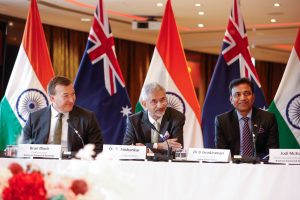While addressing the Indian diaspora in Brisbane during his recent visit to Australia, India’s External Affairs Minister S. Jaishankar attributed the significant growth in India-Australia ties to four reasons: “One PM Modi, two Australia, three the world, and fourth is all of you.”
Indeed, under the Narendra Modi government, Australia-India relations have reached unprecedented heights, and continue to grow. Both sides have used superlatives, ranging from “natural partner” to “top-tier security partner,” to describe their mutually beneficial relationship.
Bilateral trade has increased notably since the two countries signed the India-Australia Economic Cooperation and Trade Agreement (INDAUS ECTA). Talks are underway to upgrade it to a full Comprehensive Economic Cooperation Agreement (CECA), which promises to be a game changer.
A similar trajectory of transformational growth was seen in defense ties, best exemplified in India shedding its traditional reticence toward Australian participation in the Malabar exercises. Canberra has been a regular participant in the exercises since 2020, even hosting Malabar in 2023. Yet another example is how the AUSTRAHIND joint military exercise has grown in scope and complexity. In the latest iteration of this exercise being held in India, Australia is sending almost three times as many soldiers as it had sent in 2022 when the exercises first began.
Complemented by regular high-level engagements through the establishment of a bilateral 2+2 dialogue and participation in trilateral dialogues and other plurilateral cooperative mechanisms, it is clear that today India and Australia share a high level of strategic alignment. Even on issues where the two countries may not see eye to eye, such as India’s ties with Russia or the ongoing row between India and Canada, diplomatic engagement and careful posturing by both sides show how ties have matured significantly.
For a relationship marred by diverging foreign policy interests for much of the 20th century due to Cold War imperatives, today, congruence drives bilateral ties.
The next pragmatic step would be expanding this partnership in hitherto unexplored territory — the Pacific Islands region. Cooperation in this region would involve both sides taking a truly holistic approach toward the Indo-Pacific. Despite both countries repeatedly reiterating the importance of an inclusive “Indo-Pacific,” Australia has long neglected the Indian Ocean, while New Delhi has not strategically engaged with the Pacific region.
However, this seems to be changing. Australia designated the Northeast Indian Ocean as its immediate region in its 2024 National Defense Strategy and is enhancing engagement, and New Delhi is increasing its outreach and footprint in the Pacific Islands through infrastructure investments and high-level visits. Herein lies a unique complementarity in both interest and capabilities. While Australia has centered its Indian Ocean approach on India, supporting its centrality in the Indian Ocean, New Delhi’s engagements in the Pacific have largely focused on independently building its presence as a development partner. While such an approach has its own merits, the reality is that, for India, as a developing country, resource constraints have resulted in delays and even withdrawal from overseas projects. Meanwhile, Australia has been a major trade and investment partner with many Pacific Island countries and is currently the largest development partner in the region.
This is also an opportune time for New Delhi to explore cooperation with Canberra, since there is a renewed realization among Australian policymakers of the strategic importance of the region, with Foreign Minister Penny Wong promising to bring in a “new era in Australian engagement in the Pacific.”
New Delhi can prove to be a beneficial partner to Canberra. Australian foreign policy has faced challenges in extending its influence in the Pacific neighborhood. Similar to New Delhi’s experience in South Asia, Australia is sometimes viewed as a “regional bully” with some scholars even describing it as a “hollow hegemon.” Australian engagement is even criticized for being sporadic and uneven, driven by occasional crises rather than sustained engagement.
Here, New Delhi’s own approach to development partnerships, which is defined by its own developmental experiences focused on mutual growth and non-interference, is better suited. In his speech at the Third Forum for India-Pacific Islands Cooperation Summit last year, Modi reiterated how India “respects your [the Pacific Islands’] priorities” and “feels proud to be your development partner,” which resonated well. At a time when developing countries, despite pouring aid and resources, are struggling to win influence, New Delhi has successfully positioned itself as a reliable partner.
In the past, we have seen how the simultaneous deterioration of their relations with China proved to be an impetus for a closer Australia-India partnership. Both Canberra and New Delhi again face the challenge of China’s creeping expansion in the Pacific and Indian Ocean, respectively. Given that such presence in their immediate maritime neighborhood is of primary concern — as it should be for prudent and pragmatic reasons — when it comes to distant geographies, it is only logical that the two countries should cooperate based on a burden-sharing approach to avoid strategic overreach.

































